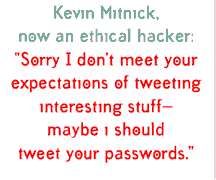
I (@bobarno) recently wrote about my reluctance to use Twitter and the pros and cons of sharing information with everyone who might be a follower. Not about the benefits of twittering, which I fully appreciate and understand, but about my own reservations and the extent of my own involvement. My concerns were competitive intelligence repercussions, and maybe my own desire to be as spunky (in a tweet) as I try to be on stage.
Well, this is obviously a timely subject matter, faced by many busy executives. In the last couple of weeks conversations with like-minded entertainers, speakers and bookers have all raised similar concerns. On May 27, Molly Murray-Threipland (who often writes about twittering in The New York Times), made the observation that it isn’t teenagers who are the largest tweeting group, but the 45 to 54’s.
Just three weeks after I wrote my own blog post, Business Week (May 21) dedicated its main theme, cover page, and several articles to the same issues. The two lead stories were Learning, and Profiting, from Online Friendships and Web 2.0: Managing Corporate Reputations.
In Managing Corporate Reputations, Gina Poole, vice-president of social software programs and enablement at IBM—that’s right, her life centers solely on how to train and harness IBM’s employees’ twitter posts—said, “You’re building your social reputation, so you don’t want to be a frivolous or an uninteresting person,” and the article summarizes “while many see Twitter as a place to indulge one’s inner self, IBM wants employees to “add value” in all their online postings.” Of course that’s seen from the perspective of the corporation and its concern of corporate image and identity.
On being perceived as mundane versus a source of brilliant repartee with deep content, take look at Kevin Mitnick’s tweets. Kevin (@kevinmitnick), one of the world’s most famous or infamous hackers, depending on your point of view of anyone who has served time in “the box” (prison-slang for a full-board vacation, courtesy of the U.S. government), twitters occasionally and has many followers. Kevin is an astute …˜social engineer’ (maybe one of the all-time best), a great observer of human behavior, and equally funny (privately at least); but Kevin does not share his latest skill sets or pen-testing exploits in his tweets. A follower (of Kevin’s) recently complained: “You never tweet anything interesting! Just your travel schedule. Tell us what you’re working on. something! Unfollow.” Kevin replied “Sorry I don’t meet your expectations of tweeting interesting stuff meniscuss—maybe i should tweet your passwords—hehe.”
Of course what they really want is some insight in “hacking” so that they can do what Kevin does, for fun or profit. High-profile pen-testing is a murky world and probably very profitable for those with the ultimate knowledge base. The hackers at the top of the food-chain have strong relationships, globally, with the …˜bad guys.’ Is it conceivable that Kevin, or someone like Kevin would tweet: “in St Petersburg today hanging with Dmitri Androsov & the Hell Knights Crew, & we’re working on some cute BackTrack exploits.” Not a chance! Acknowledging sources, or anything that would let your readers deduce your ‘deep’ friends would have to be restricted.
That’s like me asking a pickpocket in Barcelona Continue reading

